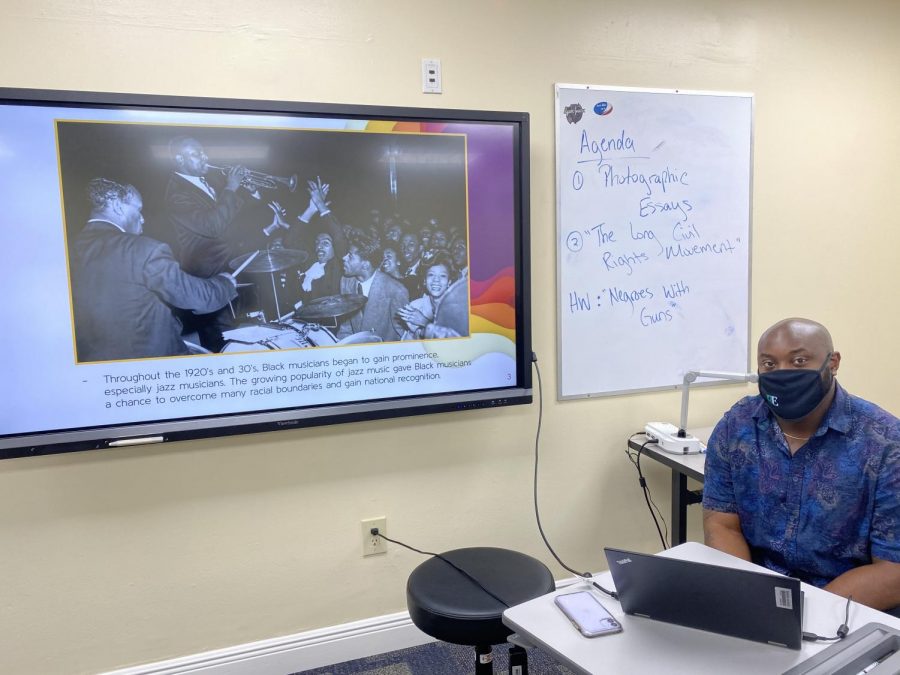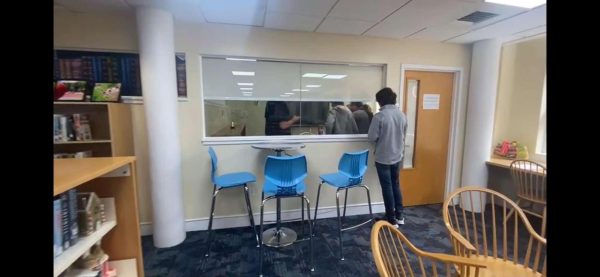“Represent,” a new elective with Mr. Raheem Jackson, reimagines Black history
Mr. Jackson, an educational entrepreneur, speaks about his new class
Mr. Raheem Jackson has been a part of the Ransom Everglades community for two years. His RE career began with teaching United States History to sophomores, but this year he has ventured into a new academic realm, developing a course called “Represent: Black Voices in Social Movements.”
The vision for this new curriculum is a discussion-based class where students take a journey through history, starting in the late 1700s until the modern–day, focusing on the Black icons who influenced their communities. A mix of articles, books and videos allows each student to study various social justice movements and historical figures with a unique focus.
Mr. Jackson first proposed this class after teaching the textbook-oriented World Civilizations and United States History courses at RE, where he observed some gaps in their treatment of Black history. “I wasn’t really that happy with what I saw,” he said. “I taught World Civ, I taught US History, so I observed them and saw the lack of representation of Black experiences and Black stories. I didn’t like the Black stories and representation I did see. I didn’t feel like there was a comprehensive study of Black history, Black people, or Black culture.”
Mr. Jackson aims not only to educate RE students about Black history but also to foster an accepting classroom community where students can be vulnerable and expressive. Kelli Miller ’21, a current student of Mr. Jackson’s, noted, “One of the things [he] does very well is, instead of being upset and mad at the high school curriculum for not teaching things that we should know, he gets excited that he gets to teach us and let us learn.”
The class began this semester with a discussion of Chimimanda Ngozi Adichie’s TED Talk, “The Danger of a Single Story.” Adichie’s idea of looking at people, places, and movements holistically guided the class’s discussions of Martin Luther King Jr., Pan- Africanism, and the New Negro Movement.
Mr. Jackson expressed a clear goal of helping students look at history differently, which stems from his fear that “students with marginalized identities would feel disempowered when seeing the story of American history being told in a way that highlighted exclusively the way they had been mistreated, and for that to be the only thing there—nothing about joy.” Students have learned to accept that history is told through varying lenses, but that they must broaden their scope of information to get closer to the truest story.
To demonstrate the complexity of history, Mr. Jackson assigned students a project about Martin Luther King, Jr. He pushed them to compare what they knew about this famous historical figure and the dominant narrative about him against all the new things they learned by reading many of his speeches.
Mattie Barfield ’21 explained how this class is conducted differently compared to other social science courses she has taken at RE. “We did a bunch of poetry, and Mr. Jackson would tell us to go through it line by line, saying, ‘Tell me how you feel. Tell me what you think,’ and then we would go off and write our own version of it.” Barfield acknowledged that she had never had an opportunity, before this course, to thoroughly comprehend poetry written specifically by Black individuals. She now feels that she can more fully understand how different movements and struggles have been expressed artistically.
Many discussion-based classes have struggled in the wake of the COVID-19 pandemic and the transition to hybrid learning. Students in Mr. Jackson’s class, however, have engaged with him “like it is any other year,” noted Rachel Bienstock ’21. “We maintained exciting conversations, and the people online were always able to participate.”
Additionally, Mr. Jackson noted that his students have made impressive efforts to find connections between current events and Black history—a project that became all the more urgent after the death of George Floyd. While many RE students engaged in Black Lives Matter protests last summer and worked to call out racial injustices, few know the history behind these movements; for students in the class, the experience has been eye-opening.
“We just kept thinking: How did we not know any of this?” said Bienstock, who took the class last semester. Miller also reflected that she feels clueless at times but is “learning more in this class than [she] ever has. It’s a pretty small class so we’re always having discussions, not lectures, and Mr. Jackson lets us learn from each other and interpret things for ourselves.”
Dani Ortiz ’21, who took “Represent” last semester, added that “the class changed my perspective of the world, because I learned a bunch of different narratives of history and was exposed to a lot of new information that I had never learned before. It changed the way that I will move forward in the future.”
Despite positive responses from students, only a few students will have taken “Represent” by the end of its first year, due in part to the fact that it is a semester-long elective. Though thrilled with the class thus far, Mr. Jackson said he is interested in finding ways to incorporate some of the texts and ideas from “Represent” into mandatory courses, such as World Civilizations or US History for underclassmen.
Still, although the class is not mandatory, students who have taken it maintain that learning about history from an alternative perspective is essential to understanding the modern world.
“It’s emotional,” Miller concluded. “I walk into that class and know I am going to learn something that I will think about for the rest of the day and take with me for the rest of my life.”





